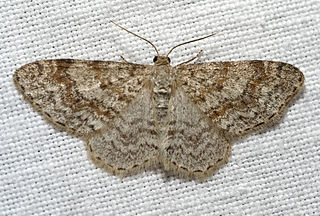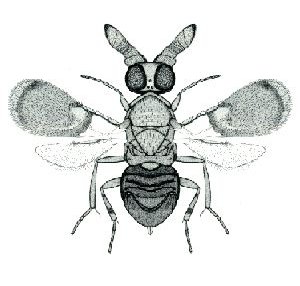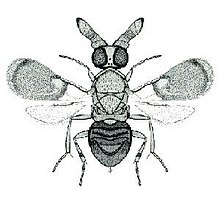A genus is a taxonomic rank used in the biological classification of living and fossil organisms, as well as viruses, in biology. In the hierarchy of biological classification, genus comes above species and below family. In binomial nomenclature, the genus name forms the first part of the binomial species name for each species within the genus.

Pope Anicetus was the Bishop of Rome from c. 157 to his death in 168. According to the Annuario Pontificio, the start of his papacy may have been 153. Anicetus actively opposed Gnosticism and Marcionism. He welcomed Polycarp of Smyrna to Rome, to discuss the controversy over the date for the celebration of Easter.

Gentianales is an order of flowering plants, included within the asterid clade of eudicots. It comprises more than 16,000 species in about 1,138 genera in 5 families. More than 80% of the species in this order belong to the family Rubiaceae.

A pseudoscorpion, also known as a false scorpion or book scorpion, is an arachnid belonging to the order Pseudoscorpiones, also known as Pseudoscorpionida or Chelonethida.

The Crassulaceae, also known as the stonecrop family or the orpine family, are a diverse family of dicotyledon flowering plants characterized by succulent leaves and a unique form of photosynthesis, known as Crassulacean acid metabolism (CAM). Flowers generally have five floral parts. Crassulaceae are usually herbaceous but there are some subshrubs, and relatively few treelike or aquatic plants. Crassulaceae are a medium size monophyletic family in the core eudicots, among the order Saxifragales, whose diversity has made infrafamilial classification very difficult. The family includes approximately 1,400 species and 34–35 genera, depending on the circumscription of the genus Sedum, and distributed over three subfamilies. Members of the Crassulaceae are found worldwide, but mostly in the Northern Hemisphere and southern Africa, typically in dry and/or cold areas where water may be scarce. although a few are aquatic.

Saint Hegesippus, was a Christian chronicler of the early Church who may have been a Jewish convert and certainly wrote against heresies of the Gnostics and of Marcion. The date of Hegesippus is insecurely fixed by the statement of Eusebius that the death and apotheosis of Antinous (130) occurred in Hegesippus' lifetime, and that he came to Rome under Pope Anicetus and wrote in the time of Pope Eleuterus.

Skinks are lizards belonging to the family Scincidae and the infraorder Scincomorpha. With more than 1,500 described species, the Scincidae are one of the most diverse families of lizards. Common skinks include many different kinds such as the slender skink, snake-eyed skink and the skinks of the genus Plestiodon are among the common skinks.
Anicetus is a Latin given name, from Greek Ανίκητος (Aníkētos), means "invincible", and may refer to:
Anicetus was the leader of an unsuccessful anti-Roman uprising in Colchis in AD 69. He claimed to be acting on behalf of Vitellius, and destroyed a cohort and part of the Roman fleet stationed at Trapezus. The revolt was put down by the Roman reinforcements under Virdius Geminus, a lieutenant of Vespasian. Overtaken at the mouth of the river Chobus, Anicetus was surrendered to the Romans by the local tribesmen, and executed.

Gelechioidea is the superfamily of moths that contains the case-bearers, twirler moths, and relatives, also simply called curved-horn moths or gelechioid moths. It is a large and poorly understood '"micromoth" superfamily, constituting one of the basal lineages of the Ditrysia.
Alexiares and Anicetus are minor deities in Greek Mythology. They are the immortal sons of Heracles, the greatest of the Greek heroes and the strongest mortal to live, and Hebe, the goddess of youth the server of Ambrosia and nectar to the other Olympian gods. Along with their father Heracles, they possibly were the guardians of Mount Olympus, and the pair may have been regarded as the gatekeepers of Olympus, a role which was often assigned to their immortal father. Additionally, they were likely responsible for the protection and fortification of towns and citadels. They were born after the hero's mortal death and assent to Olympus, where he gained immortality and married the goddess Hebe. Callimachus makes a reference to Hebe receiving assistance from her sister, Eiliethyia the goddess of midwifery, while in labour. Their names mean "he who wards off war" and "the unconquerable one" respectively.

The Tephritinae are a subfamily of tephritid fruit flies.

The Trypetinae are a subfamily of tephritid fruit flies.

Mesostigmata is an order of mites belonging to the Parasitiformes. Unlike most members of that group, many of these mites are not parasitic but free-living and predatory. They can be recognized by the single pair of spiracles positioned laterally on the body.

Asthenini is a tribe of geometer moths under subfamily Larentiinae first described by Warren in 1893. The tribe has been combined with Eupitheciini in the past, most notably by Jeremy Daniel Holloway in his work The Moths of Borneo.
William Warren was an English entomologist who specialised in Lepidoptera.

Dendrobieae is a tribe in the subfamily Epidendroideae, in the family Orchidaceae.

Anicetus is a parasitic wasp genus in the subfamily Encyrtinae.
Anicetus was a freedman of the Roman emperor Nero, who, along with the freedman Beryllus, tutored the young emperor.












